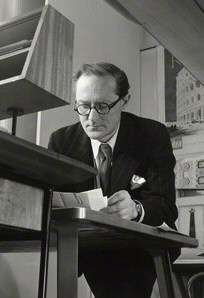Hugh Casson
| Sir Hugh Casson | |
|---|---|
 Casson in his office, early 1950s; vintage bromide print by John Gay, from the photograph collection of the National Portrait Gallery | |
| Born |
Hugh Maxwell Casson 23 May 1910 London |
| Died |
15 August 1999 London |
| Nationality | British |
| Known for | architect |
| Spouse(s) | Margaret Casson |
| Awards | Albert Medal (1984) |
| Elected | President, Royal Academy |
Sir Hugh Maxwell Casson, CH, KCVO, PRA, RDI (23 May 1910 – 15 August 1999), was a British architect, interior designer, artist, and writer and broadcaster on 20th-century design. He was the director of architecture at the 1951 Festival of Britain on London's South Bank.
Life
Casson's family originated from Wales. He was the nephew of actor, Sir Lewis Casson. Casson studied at Eastbourne College in East Sussex, then St John's College, Cambridge (1929–31), after which he spent time at the Bartlett School of Architecture in London.
Work
Before the Second World War, he divided his time between teaching at the Cambridge School of Architecture and working in the London office of his Cambridge tutor, architect Christopher (Kit) Nicholson. During the war, he worked in the Camouflage Service of the Air Ministry.[1]
Casson was appointed to his role as director of architecture of the Festival of Britain in 1948 at the age of 38,[2] and set out to celebrate peace and modernity through the appointment of other young architects. For example, the Modernist design of the Royal Festival Hall was led by a 39-year-old, Leslie Martin. Casson's Festival achievements led to his being knighted (KCVO) in 1952.
After the war, and alongside his Festival work, Casson went into partnership with young architect Neville Conder. Their projects included corporate headquarters buildings, university campuses, the Elephant House at London Zoo, a building for the Royal College of Art (where Casson was Professor of Interior Design from 1955 to 1975, and later served as Provost), and the master planning and design of the Sidgwick Avenue arts faculty buildings for the University of Cambridge, including the Austin Robinson Building which houses the Faculty of Economics as well as the Marshall Library of Economics. This latter project lasted some 30 years.
A close friend of the British royal family, Casson designed the interior of the royal yacht Britannia and is also credited with having taught Charles, Prince of Wales to paint in watercolours. He was elected to the Royal Academy in 1970, and was its President from 1976 to 1984. In 1978, he was elected to the National Academy of Design as an Honorary Corresponding member.
In the 1980s Casson became a television presenter, with his own series, Personal Pleasures with Sir Hugh Casson, about stately homes and places he enjoyed.
Casson supplied watercolour illustrations for a new edition of Sir John Betjeman's verse autobiography Summoned by Bells (1960); The Illustrated "Summoned by Bells" was published by John Murray in 1989.[3]
Honours
In the 1985 New Years Honours List, Casson was appointed to the Order of the Companions of Honour.[4]
Legacy
The Victoria & Albert Museum houses Casson's archives, and materials can be consulted at Blythe House, 23 Blythe Road, by appointment.
The Royal Academy awards "The Hugh Casson Drawing Prize" annually "for an original work on paper in any medium, where the emphasis is clearly on drawing".[5]
Casson is commemorated by Private Eye′s Sir Hugh Casson Award, recognising the "Worst New Building of the Year" in the Nooks and Corners column.
References
- ↑ Lionel Esher. Obituaries: Sir Hugh Casson. The Independent, 17 August 1999. Accessed March 2012.
- ↑ Sir Hugh Casson, CH KCVO PRA RDI RIBA FSIAD, architect... painter... author, 1910 – 1999. Sir Hugh Casson Ltd. Accessed March 2012.
- ↑ John Betjeman, Sir Hugh Casson (ill.) (1989) The Illustrated "Summoned by Bells". London: John Murray, ISBN 0-7195-4696-6.
- ↑ Supplement to the London Gazette 31 December 1984. The London Gazette 49969:18. Accessed March 2012.
- ↑ "Prizes", Royal Academy of Arts.
External links
- Eulogy, "Hugh Casson 1910–1999" by Peter Davey, in Architectural Review, October 1999.
- "Archives of Sir Hugh Casson and Margaret Macdonald Casson". Architecture. Victoria and Albert Museum.
- Official website for Sir Hugh Casson
- Works by Sir Hugh Casson at Thompson's Gallery
| Cultural offices | ||
|---|---|---|
| Preceded by Sir Thomas Monnington |
President of the Royal Academy 1976–84 |
Succeeded by Roger de Grey |
|